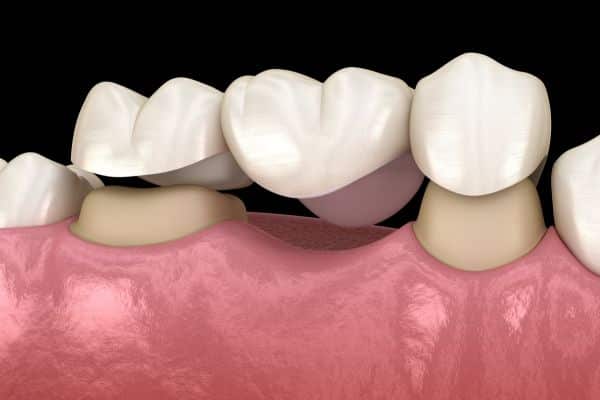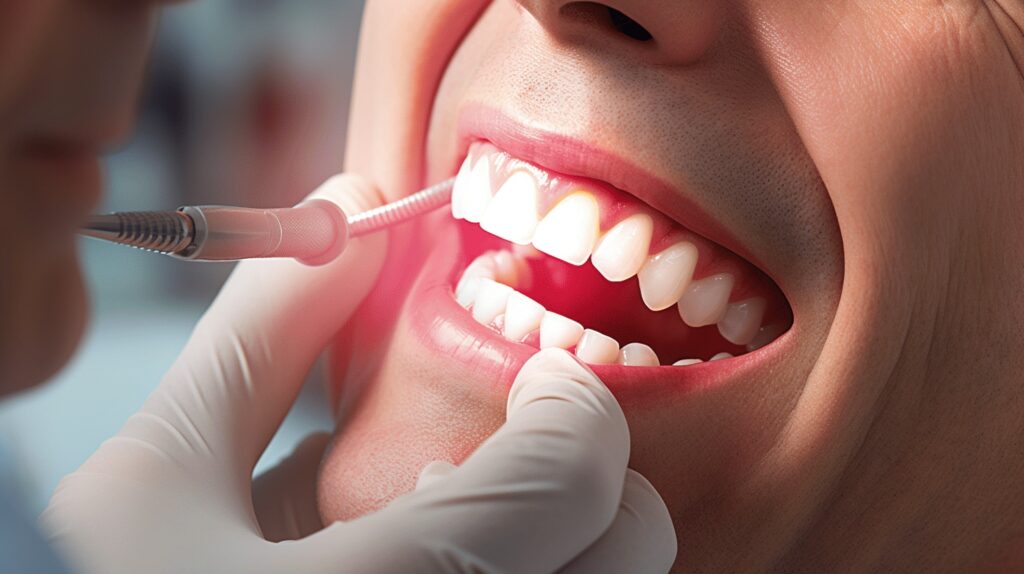Imagine you’re enjoying your favorite dessert, and suddenly, there’s an unexpected crunch.
You feel around with your tongue and realize with a sinking feeling – your filling or crown has fallen out!
Hold off on the panic; a lost filling or crown may seem like a dental emergency, but don’t worry, we’ve got you covered. 😊
In this article, we’ll delve into why this happens, how to deal with the situation immediately, and more importantly, ways to prevent it in the future.
We’ll walk you through some quick home remedies to alleviate any discomfort you may feel, tell you how to recognize when it’s the right time to seek professional dental care, and help you navigate this seemingly daunting experience with ease.
Trust us, by the end of it, you’ll be ready to crack a confident smile, safe in the knowledge that a lost filling or crown is no big deal, as long as you’re equipped with the right information.
Let’s dive right in!
Table of Contents
Understanding Lost Fillings and Crowns
When one brings up dental emergencies, several scenarios might come to mind ─ a knocked-out tooth, a severe toothache, or a mouth injury.
However, something as seemingly minor as a lost filling or crown also deserves the tag of ‘emergency.
🚨 Too often, this problem is overlooked, but not today, as we go through its causes and implications in detail.
Causes of Lost Fillings and Crowns
Crowns and fillings might fall off due to various reasons.
They may seem small, but when they come out, it can lead to severe discomfort and potentially hazardous oral health implications.
Here are some reasons why this might happen:
- Decay: Tooth decay isn’t just a problem for your natural teeth. The bacteria responsible for cavities can build up under your crown or around your filling, gradually eating away at the tooth. Over time, this can loosen the crown or filling, causing it to fall out. 🦷💔
- Wear and Tear: Like everything else in life, fillings and crowns aren’t immortal. The rigors of biting, chewing, and grinding can gradually wear them down over time. Eventually, this can lead to the crown or filling become loose and fall off. 🦴⌛️
- Improper Fitting: Sometimes, the problem starts right at the beginning. If the crown or filling wasn’t properly fitted in the first place, it could come loose and fall off. It’s essential to ensure your restorations fit properly right from the get-go. 🔧🛠️
Additionally, remember, lost fillings and crowns are common dental emergencies that require immediate attention.
The gaps they leave behind can lead to further decay, infection, or other issues if not addressed quickly.
So, don’t wait – consult your dentist to discuss replacement options as soon as you can. 👩⚕️👨⚕️
Viewing these restorations as more than simple fixes to your dental woes is key. They play an integral role in maintaining your overall oral health.
By understanding the causes behind their dislocation, you empower yourself with the information needed to prevent such incidents and respond appropriately when they happen. 🧠👍
Immediate Steps to Take
Ouch! That moment when you realize you’ve lost a filling or crown can be quite bothersome, not to mention that it can potentially lead to further damage or discomfort.
Fear not! We’ve got your back and are here to guide you on the immediate steps to take if you suddenly find yourself in this unenviable situation. 👀
Temporary Solutions
Before you reach out to your dentist, let’s discuss some practical temporary solutions:
- Over-the-counter dental cement: This is available at most drugstores and can be a great short-term solution until you get to your dentist. It helps protect the exposed tooth area and mitigate discomfort.
- Dental Wax or Sugar-Free Gum: If you don’t have dental cement available, you can use dental wax or even a piece of sugar-free gum to cover the area temporarily.
- Avoid hard and sticky foods: You don’t want to have any more pressure or stress on your tooth, so it’s recommended to avoid any food or snacks that could cause more damage.
- Pain relief: You may experience some discomfort or sensitivity. In such cases, over-the-counter pain relievers or home remedies like clove oil could offer some relief.
“It is important to take immediate action when a filling or crown is lost to prevent further damage or discomfort.”
Please note, these are just temporary solutions!
We cannot stress enough the importance of contacting your dentist to get a permanent fix. The health of your teeth is of paramount importance, and while we’ve equipped you with handy tips to tackle the problem initially, it’s essential to get professional help to avoid future complications 🦷💼!
Remember folks, we’re just a click away. So the next time you or your loved one loses a filling or a crown, you know what to do. Let’s keep that smile wide and bright, with confidence! 😊
Temporary Solutions for Lost Fillings and Crowns
Now let us dive into an unavoidable and quite annoying dentistry problem – lost fillings or crowns.
Whether you’re on vacation, at a business meeting, or simply trying to enjoy your weekend at home, a lost filling can throw a wrench in your plans.
However, fret not, as we’re here to ease your dental woes away with some simple, temporary solutions before you can make it to your dentist’s office.
First on our list is dental wax or dental silicone.
This nifty little product temporarily fills the void left by the lost filling. It provides a smooth surface, preventing discomfort caused by sharp or rough tooth edges.
However, it’s suggested not to eat on the affected side as it can dislodge the wax.
Another highly effective temporary solution is the classic fix – over-the-counter dental cement.
Yes, it’s as straightforward as it sounds. This temporary filling material is available at most pharmacies, and it’s incredibly easy to use.
Just mix the cement according to the instructions, fill it into the cavity, and let it set.
- It provides relief from discomfort and sensitivity
- It prevents further decay and damage
- It’s affordable and easily accessible
That said, this is just a quick fix, and it doesn’t eliminate the need for professional dental care. As the name suggests, these solutions are just temporary.
“Every tooth in a man’s head is more valuable than a diamond.” – Miguel de Cervantes.
We couldn’t agree more with Cervantes. Our teeth are small but mighty; they carry the enormous responsibility of aiding digestion, speech, and influencing our appearance.
Therefore, we must never ignore any dental discomfort or troublesome signs. If you lose a filling or crown, try covering it with dental wax or filling it with over-the-counter dental cement.
But remember to book an appointment with your dental healthcare providers at the earliest possible opportunity. Ensuring your oral health is a pivotal part of maintaining your overall health.
Next, we look at some common reasons why your fillings or crowns could fall off, helping you better avoid such instances in the future.
Knowledge is the first step towards prevention, right?
Home Remedies to Alleviate Discomfort
Oh toothache, the unwelcome guest!
You experience it in the middle of a blissful slumber or right before a highly anticipated dinner date, and it immediately turns your world upside down.
😓 Then follows a frantic search for dentist appointments that are unfortunately always scheduled for a later date, often leaving you in weeks of discomfort before you can finally breathe a sigh of relief.
But fear not dear friend, because we’re here to help you sail through those challenging times!
We’ll share with you a few tried and tested home remedies that can help alleviate discomfort until you’re able to see a dentist.
These remedies aren’t a replacement for professional dental care, but they could provide temporary relief.
Saltwater Rinse
First on our list is a good old-fashioned saltwater rinse.
When an unexpected toothache strikes, many people reach for a saltwater rinse—and for a good reason.
- It’s natural and safe.
- It’s an effective antiseptic.
- It could help reduce inflammation and heal any oral wounds.
Simply mix half a teaspoon of salt into a warm cup of water and rinse your mouth thoroughly with the solution.
Repeat this process for a few days until you can visit a dentist.
Clove Oil
Clove oil is a highly potent remedy known for its pain-relieving properties.
Let’s dive into what makes it so beneficial:
- It offers numbing effects, reducing oral discomfort.
- It contains eugenol, a natural antiseptic.
Take a small cotton ball, dab it with clove oil, and gently apply it to the affected area for immediate relief.
Dental Wax
Last, but definitely not the least, is dental wax.
Particularly useful for those with braces, dental wax can help ease discomfort caused by braces rubbing against your cheeks or gums.
- It offers a smooth barrier between your braces and your mouth.
- It’s safe and easy to apply.
Now, doesn’t that feel better already? While these remedies can provide momentary relief, remember, they’re not a permanent solution.
Make sure you book an appointment with your dentist as soon as possible.
Until then, let these remedies be your beacon of hope in painful times! 😊
Preventing Future Dental Emergencies
If there’s one thing we can all agree on, it’s that dental emergencies are no fun at all. 😣
Toothaches, chips, breaks, and knocked-out teeth can really throw a wrench in your plans. But did you know that you can take some simple steps to prevent many dental emergencies?
Regular dental check-ups and practicing good oral hygiene can go a long way in keeping you safe.
Let’s dive into this idea a little further 🏊♀️.
Regular Dental Check-ups
The first key 🔑 to preventing dental emergencies is getting regular check-ups with your dentist.
These appointments are about much more than just a quick cleaning. A dentist can spot early signs of trouble, when treatment is much easier and less painful.
Here’s what a regular dental check-up can do for you:
- Help detect problems before they get serious: A small cavity today could turn into a painful toothache tomorrow.
- Maintain your overall oral health: More than just your teeth, your gums, tongue, and jaw also benefit from regular check-ups.
- Save your money: By catching problems early, you avoid expensive treatments in the future.
Good Oral Hygiene Practices
In addition to your regular dentist visits, practicing good oral hygiene at home is equally important.
This is a simple and effective method of preventing most dental emergencies.
Here’s a list of practices we recommend:
- Brush your teeth twice a day: Use a toothpaste that contains fluoride to strengthen your teeth.
- Floss daily: This helps remove food trapped between your teeth which can lead to cavities if ignored.
- Limit sugary drinks and snacks: Sugar feeds the bacteria in your mouth which can damage your teeth.
Remember, a good check-up, paired with excellent oral hygiene habits, is your best defense against dental emergencies.
By integrating these practices into your daily life, you’ll not only save yourself pain and discomfort but also keep your smile bright and healthy! 😄
So, friends, simple steps such as regular dental check-ups and good oral hygiene practices can save us from a lot of potential dental problems.
After all, prevention is far better than cure, isn’t it?
When to Seek Professional Dental Care
In our efforts to enhance our oral health, we often stick to the daily regimen of brushing, flossing, and using mouthwash.
Yet, there are certain situations when our at-home dental care may not be sufficient, and we need to seek professional dental help.
While routine check-ups play a crucial role in maintaining oral health, there are signs that should prompt immediate visits to a dentist.
Signs that Immediate Professional Care is Needed
- Severe Toothache: Believe us when we say you don’t want to ignore this one! An intense and persistent toothache may indicate that there’s an underlying issue that needs to be addressed promptly.
- Bleeding or swollen gums: This could be a sign of gingivitis or other gum diseases. If you spot any of these symptoms, it’s crucial to seek professional dental care immediately.
- Loose teeth: As adults, loose teeth are never normal. This could be due to injury, gum disease, or bone loss.
- Persistent bad breath or bad taste: This might be a sign of gum disease or other serious oral health problems like mouth cancer.
- Visible signs of infection: Discoloration, swelling, abscess, or fever? 😷 These are not just signs of poor oral hygiene, but also potential harbingers of a serious infection.
- Persistent mouth sores: Mouth sores that don’t heal could be an indication of oral cancer. It’s best to consult your dentist immediately if a mouth sore lasts for more than two weeks.
So, while brushing our teeth vigorously might give us the feeling of thorough cleanliness, we mustn’t dismiss or ignore these symptoms.
Each of these alarming signs indicates the need for immediate professional dental care.
Remember that your oral health is a window to your overall health.
So, let’s keep our smiles healthy and bright, and not be shy about getting regular check-ups and professional dental care!
Prevention is indeed better than cure, and a healthy smile is always worth the effort. 😁🦷💕
Conclusion
Dealing with a lost filling or crown can be stressful, but with these handy tips, you can manage this dental emergency like a pro.
Remember, it’s only a temporary fix. You should always prioritize professional dental care. Nobody should compromise on their oral health.
At Wilshire Smile Studio, we partner with you to ensure dental crisis doesn’t hamper your daily life. Our dental experts will assist in resolving your dental concerns promptly and get your radiant smile back.
Remember, prevention is always better than cure. Keep up with your regular dental check-ups and maintain a good oral hygiene routine to avoid such dental emergencies in the future.
After all, a healthy smile is a beautiful smile! 😊
Secure your oral health today by booking a free consultation with us online or calling (323) DENTIST (323-336-8478)
Frequently Asked Questions
1. What should I do if I lose a filling or crown?
If you lose a filling or crown, it’s important to contact your dentist as soon as possible. In the meantime, you can temporarily fill the cavity with dental cement or sugar-free gum to protect the area.
2. Can I use over-the-counter dental cement to fix a lost filling or crown?
Yes, over-the-counter dental cement can be used as a temporary fix for a lost filling or crown. However, it is important to visit your dentist to have the filling or crown properly replaced.
3. What are the potential risks of leaving a lost filling or crown untreated?
Leaving a lost filling or crown untreated can result in sensitivity, pain, and further damage to the tooth. It’s crucial to seek prompt dental care to avoid complications and maintain oral health.
4. How long can I wait to get a lost filling or crown replaced?
It’s best to get a lost filling or crown replaced as soon as possible. Delaying replacement increases the risk of further damage to the tooth and may require more extensive dental treatment.
5. Are there any temporary home remedies for a lost filling or crown?
While there are temporary home remedies such as using dental cement or sugar-free gum to fill the cavity, it’s essential to seek professional dental care to ensure a long-term, proper replacement.






